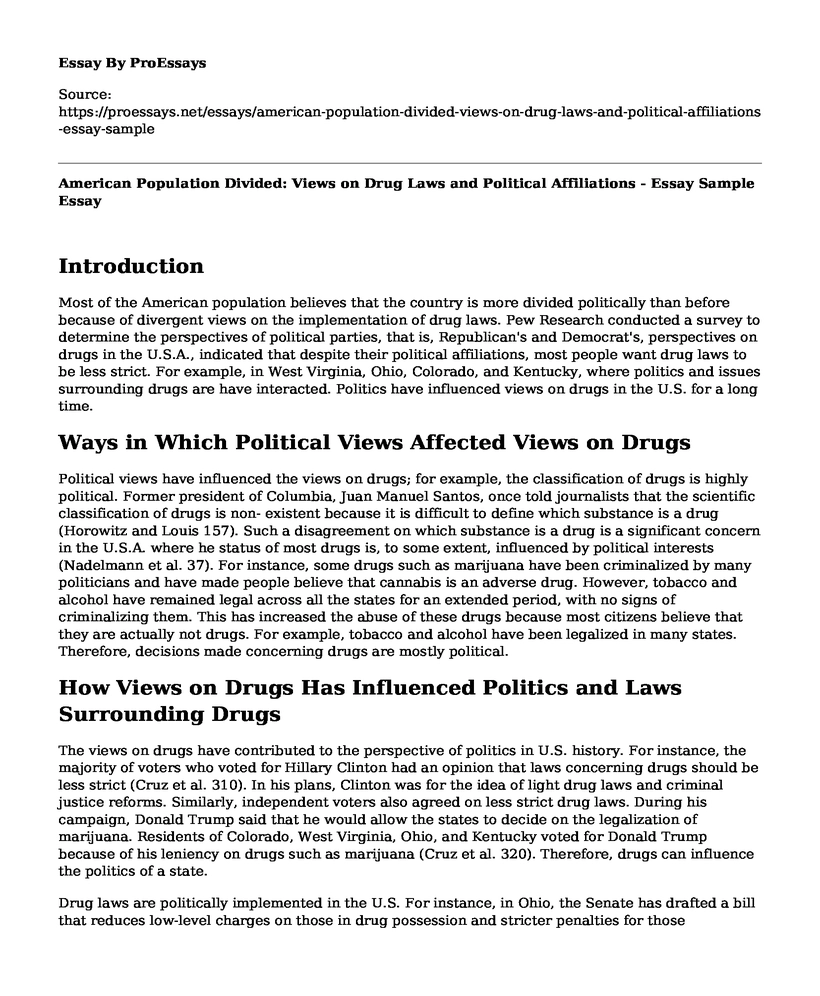Introduction
Most of the American population believes that the country is more divided politically than before because of divergent views on the implementation of drug laws. Pew Research conducted a survey to determine the perspectives of political parties, that is, Republican's and Democrat's, perspectives on drugs in the U.S.A., indicated that despite their political affiliations, most people want drug laws to be less strict. For example, in West Virginia, Ohio, Colorado, and Kentucky, where politics and issues surrounding drugs are have interacted. Politics have influenced views on drugs in the U.S. for a long time.
Ways in Which Political Views Affected Views on Drugs
Political views have influenced the views on drugs; for example, the classification of drugs is highly political. Former president of Columbia, Juan Manuel Santos, once told journalists that the scientific classification of drugs is non- existent because it is difficult to define which substance is a drug (Horowitz and Louis 157). Such a disagreement on which substance is a drug is a significant concern in the U.S.A. where he status of most drugs is, to some extent, influenced by political interests (Nadelmann et al. 37). For instance, some drugs such as marijuana have been criminalized by many politicians and have made people believe that cannabis is an adverse drug. However, tobacco and alcohol have remained legal across all the states for an extended period, with no signs of criminalizing them. This has increased the abuse of these drugs because most citizens believe that they are actually not drugs. For example, tobacco and alcohol have been legalized in many states. Therefore, decisions made concerning drugs are mostly political.
How Views on Drugs Has Influenced Politics and Laws Surrounding Drugs
The views on drugs have contributed to the perspective of politics in U.S. history. For instance, the majority of voters who voted for Hillary Clinton had an opinion that laws concerning drugs should be less strict (Cruz et al. 310). In his plans, Clinton was for the idea of light drug laws and criminal justice reforms. Similarly, independent voters also agreed on less strict drug laws. During his campaign, Donald Trump said that he would allow the states to decide on the legalization of marijuana. Residents of Colorado, West Virginia, Ohio, and Kentucky voted for Donald Trump because of his leniency on drugs such as marijuana (Cruz et al. 320). Therefore, drugs can influence the politics of a state.
Drug laws are politically implemented in the U.S. For instance, in Ohio, the Senate has drafted a bill that reduces low-level charges on those in drug possession and stricter penalties for those distributing drugs (Williams et al. 9). But this may not be something easy because drug legalization has been used for political reasons (Blumenthal and Seth 28). Therefore, drug laws are mostly manipulated for political purposes.
Conclusion
The societal perception of drugs is different from the political one. Society perceives it as something terrible. But politically, it has been used by politicians as a platform for campaigns in the U.S. Irrespective of their political alignments, people have advocated for less strict laws regarding drugs, and these laws are based on political views of politicians. Therefore, political power interconnects with the use of drugs because politicians are the ones setting drug laws.
Works Cited
Blumenthal, Seth E. "Nixon's marijuana problem: youth politics and 'law and order,'1968-72." The Sixties 9.1 (2016): 26-53.
Cruz, Jose Miguel, Rosario Queirolo, and Maria Fernanda Boidi. "Determinants of public support for marijuana legalization in Uruguay, the United States, and El Salvador." Journal of Drug Issues 46.4 (2016): 308-325.
Horowitz, Irving Louis. "The politics of drugs." Drugs and Politics. Routledge, 2017. 155-166.
Nadelmann, Ethan, and Lindsay LaSalle. "Two steps forward, one step back: current harm reduction policy and politics in the United States." Harm reduction journal 14.1 (2017): 37.
Williams, Stewart, and Barney Warf. "Drugs, law, people, place and the state: ongoing regulation, resistance and change." Space and Polity 20.1 (2016): 1-9.
Cite this page
American Population Divided: Views on Drug Laws and Political Affiliations - Essay Sample. (2023, Apr 23). Retrieved from https://proessays.net/essays/american-population-divided-views-on-drug-laws-and-political-affiliations-essay-sample
If you are the original author of this essay and no longer wish to have it published on the ProEssays website, please click below to request its removal:
- President Donald Trump's Policies, Populism, and the Rise of Authoritarianism
- Essay Sample on Politics of Criminal Justice
- Research Paper on Democracy: Government by the People, for the People
- Essay Sample on 2016 US Election: Clinton Wins Popular Vote but Trump Wins Presidency
- Essay Sample on The First Two National Governments of the USA
- Article Review Example on Human Services: Improving Quality of Life
- Free Paper Sample on Aldrich Ames, a Central Intelligence Agency Spy







